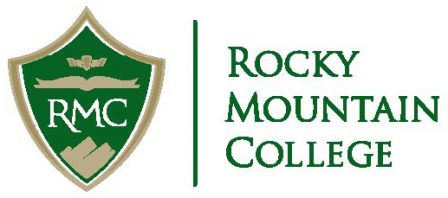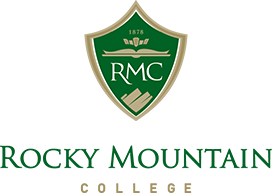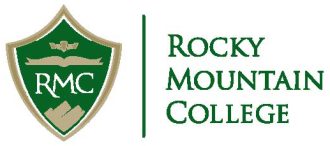Math
February 3, 2022 2024-01-25 1:45Math
"We send our students to graduate school!"
If we were allowed only one sentence to summarize our program, that would be it. Most, if not all of the students in our program do not view their bachelor's degree as the endpoint of their education; rather, they seek additional specialization (and additional compensation in the job market) by entering a graduate program that builds on the mathematical skills they have acquired at Rocky Mountain College.
Math at RMC
Mathematics is one of the most intellectually challenging and academically pure subjects. Mathematical thought is a creative process of the mind that uses only logical deduction and established results, which, in turn, have been derived from a few unarguable assumptions (axioms). Mathematical modeling is the process of critically investigating a given object (e.g. the functioning of a biological system) and of choosing or creating mathematical structures that explain the observed behavior and allow for prediction and manipulation of this object.
The mathematics program at Rocky Mountain College emphasizes both the pure and applied aspects of mathematics. At its core, our curriculum is designed to provide students with a solid foundation in the art of producing mathematically sound arguments and with a thorough knowledge of the most important modern mathematical tools and methods. In addition, we offer elective courses that give our students the opportunity to branch out and pursue their own interests. Many of these elective courses emphasize connections to other fields (such as computer science, engineering, finance, and the natural sciences).
The mathematics program at Rocky Mountain College emphasizes both the pure and applied aspects of mathematics. At its core, our curriculum is designed to provide students with a solid foundation in the art of producing mathematically sound arguments and with a thorough knowledge of the most important modern mathematical tools and methods. In addition, we offer elective courses that give our students the opportunity to branch out and pursue their own interests. Many of these elective courses emphasize connections to other fields (such as computer science, engineering, finance, and the natural sciences).
Math and the Liberal Arts
As a liberal arts college, Rocky Mountain College fosters all aspects of academic growth in its students. This is reflected in its rigorous general education requirements and its dedication to hiring highly-qualified faculty in all its academic programs. In addition, a low student-to-faculty ration and small classes allow for individualized study and meaningful interaction between professors and students. This is what sets the math program at RMC apart from other programs, e.g. at state universities: not only do our graduates have a strong background in mathematics, they also have the benefit of an individual learning experience and the opportunity of working closely with their professors. Just as importantly, they acquire skills that enhance and add value to their specialized knowledge and training in mathematics. Some of these skills are: the ability to communicate clearly and effectively both verbally and in writing; integration of ideas, methods and knowledge from sister disciplines, such as computer science and the natural sciences; and exposure to the fine arts, humanities, and social sciences.
Math and Graduate School
As mentioned above, many graduates from our program continue to go on to pursue a graduate degree in the mathematical sciences. This does not necessarily mean they seek to become mathematicians (in the traditional sense). Generally speaking, our students aim to enter graduate or professional programs that desire or require solid and advanced mathematical training. The following is an (albeit incomplete) list of these programs.
Actuarial Science (insurance mathematics/risk assessment)
Applied Mathematics (defense industry/general industry/national security)
Biology/Mathematical Biology (research)
Chemistry (research)
Computer Science (research/general industry)
Education (K-12; two- and four-year colleges; universities)
Engineering (all specializations)
Finance (research/quantitative specializations)
Forensic Science/Law
Mathematics (research/teaching)
Medical Schools/Medical Research/Neuroscience
Physics (all specializations)
Statistics (all specializations)
Math and Getting a Job
The mathematical approach to problem solving is highly valued by employers. This is especially true in emerging frontiers of research and industries with high potential for innovation. These areas need people who possess both creativity and strong quantitative skills. More generally, employees with a strong mathematical background think more abstractly, are more flexible, and are less likely to need intensive on-the-job training. This translates into higher productivity and higher compensation. As can be imagined, graduates from the programs listed above all command high salaries.
To learn more about the opportunities available to those with a math degree, visit www.maa.org/careers.
To learn more about the opportunities available to those with a math degree, visit www.maa.org/careers.
Rocky Mountain College offers the following Mathematics majors and minors:
Bachelor of Science
- Mathematics
- Mathematics Education (see also Education: Secondary)
Minor
- Mathematics
- Mathematics Education
Contact
Rocky Mountain College
1511 Poly Drive
Billings, MT 59102


